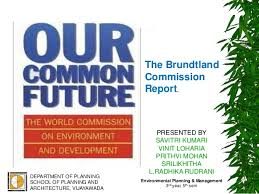It is 30 years since the Brundtland Commission published its report on Sustainable Development. This was the official response to the Club of Rome’s Limits to Growth work that created shock waves. Has anything really changed since?
Brundtland set out the meaning of sustainable development as “development that meets the needs of the present without compromising the ability of future generations to meet their own needs.” In many ways this was quite revolutionary as it talked about meeting needs rather than consumption demands and it introduced the idea of inter-generational equity raising the possibility that future generations could actually be poorer. Something today’s youth can certainly relate to but maybe difficult to imagine at the time at least in the global north.
As a result of this report global leaders gathered in Rio in 1992 to set a new agenda ¬– Agenda 21. International efforts began to address climate change as well as many other international environmental issues. The environmental movement seemed to have grown up and become official. Australia even had a strategy to promote “ecologically sustainable development” in the 90s after the green vote surged into significance in the 80s. A green dawn seemed to break.
You might have thought, job done; this must now be core to how we run our economy. You would, of course, have been wrong.
The use of the term “sustainable development” is now really a thing of the past. Policy language has generally swung back to using the term “sustainable growth”– on the face of it an oxymoron. The environment is seen as being fixed by regulation, company sustainability and so on so the important people can concentrate on growth.
In academia, it is no better even among more seemingly progressive economists. Feted US economists, Acemoglu and Robinson’s ground-breaking 2012 book Why nations fail introduced the notion of the “extractive state”. This referred to states whose institutions were designed so that the elite were able to extract wealth from the majority and hence, they claimed, trap states into failure and poverty.
“We are now in an age when we can rethink how we organise our economy on a fundamental level.”
Quite a progressive idea, even if they tended to cite the US as the ideal non-extractive state due to its political and economic institutions. Maybe they wouldn’t be so sure of that now. However they made no mention of unsustainable development, effectively the extraction of wealth by this generation from the next. They even discussed the sustainability of the Chinese economy without referencing environmental sustainability. Furthermore, none of the major commentaries on the book picked them up on it.
Just last month, top Harvard professor, Dani Rodrik’s article in The Guardian sought to extract mainstream economics from the dying embrace of neo-liberalism by redefining what good economics was. However it did not even discuss the need to recognise physical limits in economics.
This of course is all in the context of Trump promising to pull the US out of the international climate change process while dismantling environmental protection in the US and Brexiteers calling for the reduction in regulation. This is code for getting rid of the “green crap” – the one area they see eye to eye with Cameron.
Meanwhile in the higher echelons of the ecological economics camp, Tim Jackson recently wrote: “There is unsettling evidence that society is still following the ‘standard run’ of the original (Limits to Growth) study – which leads to an eventual collapse of production and living standards”.
Kate Raworth, featuring in this issue, sets out compellingly how we are clearly compromising the needs of future generations. Charles Hall, also in this issue, sets out evidence that the cheap energy that underpins our current economic system is fast disappearing.
So on the face of it, things do not bode well.
However I think there is reason for new-found hope if not optimism – an important distinction that Yanis Varoufakis makes in this issue. We definitely should not be complacent, but we can have hope and should act.
For the first time for decades, the whole way we think about the economy is under question. Rodrik’s article is one of many articles that suggest neo-liberalism – the unquestioning faith in markets – is now yesterday’s idea. In September this year Prime Minister May even felt she had to defend free market capitalism as a way of organising society.
This government is also getting serious about managing the economy strategically rather than leaving it to the markets, as Dame Kate Barker discusses in this issue. This is something the green movement always advocated. For the young, the aspiration of climbing the social ladder towards house ownership has turned to dust and they are looking for new aspirations that reflect their values.
This would have all been unthinkable in the 90s as the West celebrated its ideological victory over communism after the Berlin wall came crashing down and history ended according to Fukuyama’s influential essay.
So we are now in an age when we can rethink how we organise our economy on a fundamental level. We can ask questions in the mainstream about what an economy would look like were it to extract wealth neither from a majority to provide for the elite minority nor from future generations for this generation.
In this first subscription issue of The Mint we feature a range of articles that seek to ask those questions. Of course, we don’t have a lot of time and there is much thinking and action to be done. But the signs are that we can be hopeful now in a way we have not been able to be for decades. Maybe we can think and do the previously unimaginable.




